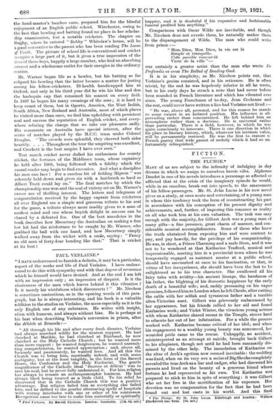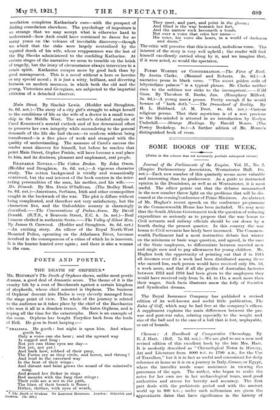FICTION.
THE PLUNGE.*
MANY of us are subject to the infirmity of indulging in day dreams in which we assign to ourselves heroic rotes. Alphonse Daudet in one of his novels introduces a personage so affected or afflicted that at the crisis of the imaginary episode ho would, while in an omnibus, break out into speech, to the amazement of his follow-passengers. Mr. St. John Lucas in his new novel gives us a study, at once acute and entertaining, of a young man in whom this tendency took the form of reconstructing his past in accordance with his conception of his present dignity and achievements, and, further, of imposing this romance as reality on all who took him at his own valuation. The task was easy enough with the majority, for Gilbert Arch was a young man of many gifts—a fine presence, great charm of manner, and con- siderable musical accomplishments. Some of those who knew the truth abstained from exposing him and were content to pay, and pay heavily, for the privilege of his companionship. He was, in short, a Prince Charming and a male Siren, and it was not to he wondered at that Katharine Trafford, musical and impressionable, meeting him in a provincial town where ho was temporarily engaged as assistant master at a public school, should have succumbed at once to his fascination, or that, in virtue of her inexperience, she should have been the last to be enlightened as to his true character. She swallowed all his fairy tales with avidity—his ancient lineage, the harshness of his father, the blighting of his domestic happiness by the early death of a beautiful wife; and, rashly presuming on his vague promises, followed him to London when he left Cheale, after cutting the cable with her selfish and tyrannous father and a terrible ultra-Victorian aunt. Gilbert was grievously embarrassed by her appearance, but his friends rallied to her aid and found Katharine work; and Violet Winter, the vivacious young actress with whom Katharine shared rooms in the Temple, strove hard to educate her out of her infatuation. For a while the process worked well. Katharine became critical of her idol; and when
his engagement to a wealthy young beauty was announced, her wounded pride came to the rescue. Unhappily, an accident, misinterpreted as an attempt at suicide, brought back Gilbert to his allegiance, though not until ho had been summarily dis- missed by the other lady. The immolation of Katharine on the altar of Arch's egotism now seemed inevitable: the wedding was fixed, when on its very eve a series of Big Shocks completely revealed the true Arch as a liar and cadger, who had disowned his parents and lived on the bounty of a generous friend whose fortune he had represented as his own. Yet Katharine wal prepared to stick to him in spite of everything : it was Gilbert who set her free in the mortification of his exposure. Her devotion was no compensation for the fact that he had been found out and lost caste in his world. And this final
• The Plunge. By St. John Lucas. Edinburgh and London; WPaga revelation completes Katharine's cure—with the prospect of finding consolation elsewhere. The psychology of imposture is so strange that we may accept what is otherwise hard to understand—how Arch could have continued to dance for so many years on to volcano of inevitable discovery—though we admit that the risks were largely neutralized by the reputed death of his wife, whose reappearance was the last of the Big Shacks administered to the confiding Katharine. At certain stages of the narrative we seem to tremble on the brink of tragedy, but the irony of circumstance always intervenes in a comic spirit. Katharine escapes more by good luck than by good management. This is a novel without a hero or heroine or any special moral ; it is just a witty, brilliant, and diverting fantasia on modern 'manners, in which both the old and the young, Victorians and Georgians, are subjected to the impartial criticism of a detached observer.



































 Previous page
Previous page